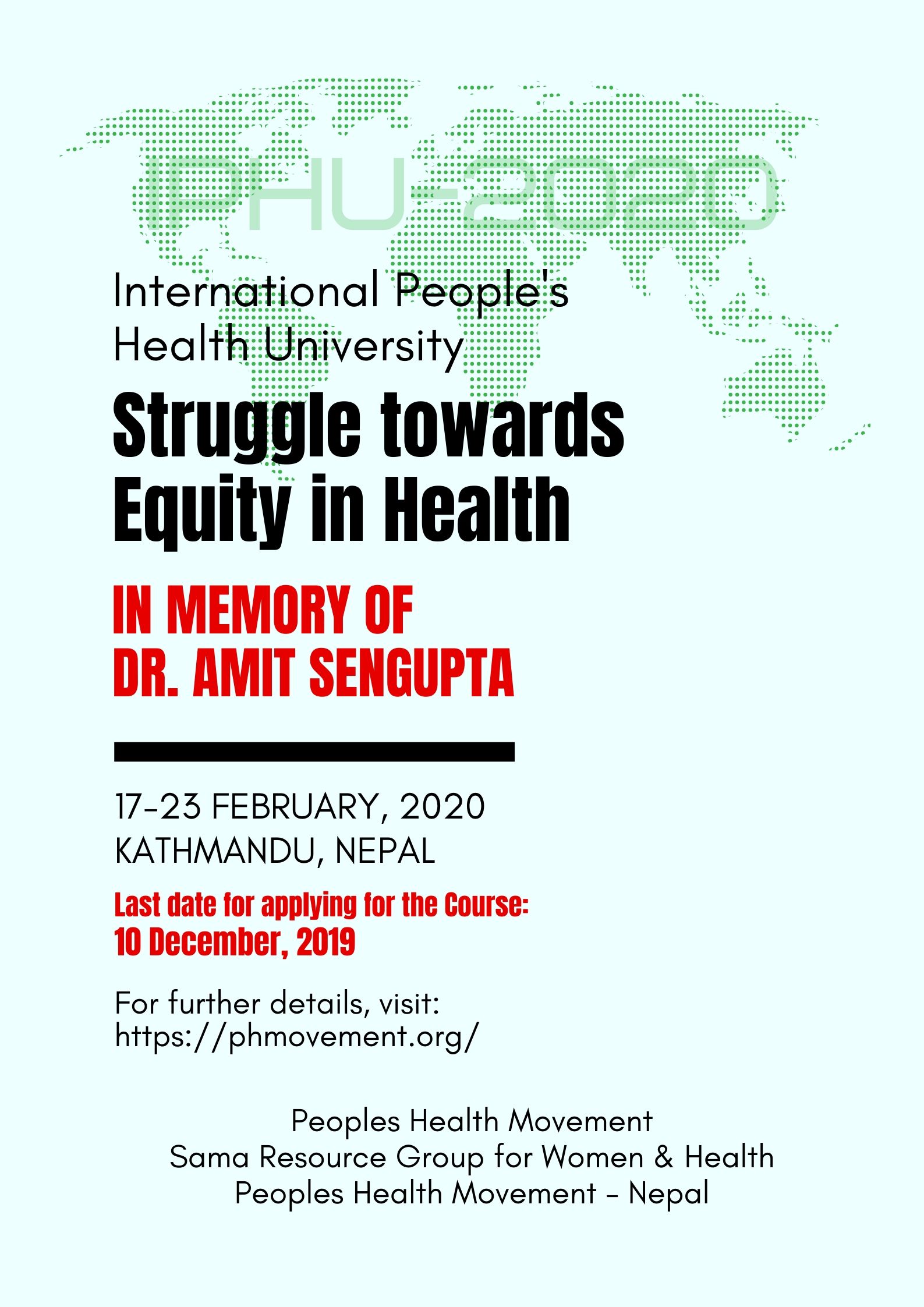
International People’s Health University (IPHU) on Struggle towards Equity in Health
in memory of Dr Amit Sengupta[i]
Organised by PHM Global [ii] and Sama Resource Group for Women and Health[iii] with PHM Nepal
Kathmandu, Nepal /17-23 February, 2020
The South Asian region is diverse in terms of its socio-cultural, ethnicity and religious contexts, as well as in terms of its economic and political circumstances. However, these diversities are accompanied by many commonalities that underpin this region - large parts of the region face extreme poverty and hunger, gender inequality, experience conflicts, displacement, climate injustice, are overwhelmed by patriarchal, religious and other fundamentalisms that challenge existing democratic aspirations and institutions. Inequities are stark within countries in the region and continue to grow, stoked by policies that deny social, economic and political justice. The countries in the region are moreover, witnessing an increasing withdrawal of the provision of services by the State with the simultaneous promotion of privatization and corporatisation. The political economy of health intersects deeply with structural discriminations that impact autonomy, personhood, “citizenship” and human rights of the people in the region. Any discourse on health and health care, therefore, necessitates a deeper understanding of the impact of these social, political and economic inequities and an analysis of their repercussions not only for physical but also mental health of the people. Understanding of the latter continues to be largely within the bio-medical framework, ignoring its social, economic and political determinants. Moreover, mental health care continues to receive low priority within public health systems and is fraught with several concerns, including low resources, inadequate skilled health workforce and unethical practices. It is also incumbent to examine the current global and regional responses to the context to assess their implications. Transformative and just action are critical to enable all the people and particularly so for those at the margins of society to resist, to surpass these challenges and enjoy their rights to life and health. An inter-sectional understanding and strategy is imperative in the South Asian region to renew the long struggles, the hard - won rights that stand threatened. International People’s Health University on the Struggle towards Equity in Health This IPHU[iv] is organised by the People’s Health Movement (PHM) Global [v] and Sama Resource Group for Women and Health with PHM Nepal. The IPHU seeks to build the capacities of young activists from South Asia to:- Strengthen knowledge and conceptual tools for equity analysis of the political, social and economic structures and dynamics (at the local, national and global levels), which frame the social and environmental determinants of health
- Broaden understanding on the social determinants of health and their intersectionality
- Enable understanding on inequities and mental health
- Conceptual clarity on Equity and Health
- Social Determinants of Health and their intersectionality
- Towards Equitable Health Systems
- Challenges to equity in health on account of conflict, climate injustice, forced migration and imposed statelessness / denial of “citizenship”
- Inequities and their implications for Mental Health
- Towards enabling equitable access to Medicines
- Impact of Trade on Health
The IPHU course will be conducted in English.
Who can apply?
Applications are invited from interested persons from Bangladesh, Bhutan, India, Maldives, Nepal, Pakistan, and Sri Lanka.
The course invites participation from women, trans-persons, men, and any other non- normative gender expressing persons from civil society organizations, public health professionals and students (community based organizations; women’s organizations; health networks; representatives from disability, LGBTQI and other social movements; students; young researchers, young medical professionals, etc.)
Applicants should be below the age of 35. Considerations for selection of participants also include:
- Persons motivated to work on issues of health equity
- Persons who are involved with the PHM and other health rights organizations / or plan to become involved in such
- People with a track record as civil society advocates for Health for All
Registration Fees
All international participants will be required to pay registration fees, on arrival for the IPHU course. Registration for the IPHU covers the cost of training materials, food and shared accommodation during the IPHU- USD30 (or equivalent) for All participants

